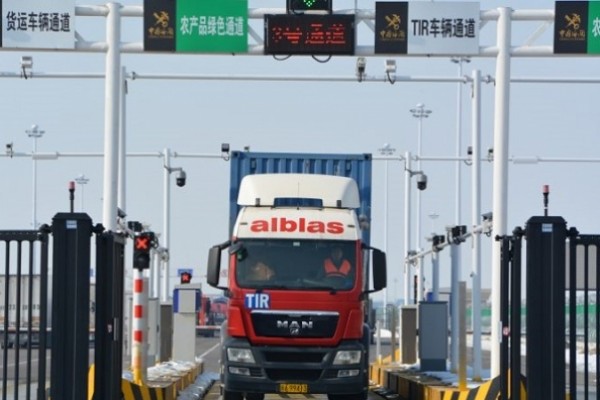| First truck completes Europe-China delivery in twelve days | |

| Author: CSEBA / Euractiv |
| 4th March 2019 |
| BEIJING - The first overland delivery of European goods bound for China arrived safe and sound last week, in a good omen for Europe’s hopes of making the East Asian superpower’s ambitious Belt and Road initiative a two-way street. |
|
All it took was 12 days for a Dutch truck laden with automobile lubricant to make a 7,400 km journey from Germany to western China, via Poland, Belarus, Russia and Kazakhstan. China’s hopes of using the so-called Belt and Road to tap into western markets is well known but Europe wants to make sure that the new silk road route functions in both directions, particularly after China ratified a UN convention on international road transport (TIR). Last year, China made the first overland delivery under the TIR to Poland in 13 days, after Kazakhstan and China opened up the crossing at the border city of Khorgas in September. Dutch company Alblas operated both trips and CEO Siebe Alblas said “we foresee a great future for road transport between China and Europe”, adding that the two pilots show that both routes are “ready to become fully operational”. Northern Italy and China will be linked by another cargo rail service from September. Faster than maritime shipping and cheaper than air freight, the service is set to be a boon for the fashion, food, automobile and hi-tech industries. EURACTIV’s partner Milano Finanza reports. Alblas also said that door-to-door costs and delivery times linked to road transport are “highly competitive compared to other modes of transport”. World Transport Organisation IRU said that costs could fall by as much as 50% compared to aviation and arrive ten days earlier than rail. The Germany-China leg was completed by just one driver and an IRU spokesperson told EURACTIV that the 12 days it took could be slashed to eight if two drivers were employed to work in shifts. At time of publishing, the same truck was on its way back to Europe with another test shipment. TIR has been operational since the late 1970s and now that a corridor exists between Europe and China, operators hope to exploit the international rules more and more. Last week’s shipment arrived with its custom seals intact as a result. Lengthy waiting times at customs checks are cited as one of the top costs for operators, as wages increase hand-in-hand. China ratified TIR in 2016 and has been implementing it ever since, although, the preparation work is substantial, given that border crossings have to be adapted and customs officials retrained to deal with new operating procedures. Road transport is set for a fight though, as Europe’s rail freight companies last week also turned their gaze to the future, pledging to double the amount of cargo carried by trains by 2030. The first freight train to run from the United Kingdom to China departed yesterday (10 April), carrying goods like vitamins, baby products and pharmaceuticals as Britain seeks to burnish its global trading credentials for when it leaves the European Union. At an event in Brussels on Wednesday (20 February), rail operators warned that freight transport makes up 10% of total CO2 emissions and that the main reason for this output is that 75% of cargo is hauled along our roads. The head of Belgian logistics company Lineas, Geert Pauwels, said that “without drastic measures, CO2 emissions will increase by a quarter, which will make our climate goal of -49% impossible. Air pollution will increase proportionally and soon we will all be stuck in traffic jams permanently.” Under the Rail Freight Forward coalition, companies want to increase European rail’s share of cargo from 18% to 30%. “This prevents us from adding a million extra lorries to our roads by 2030, 90,000 of which would be in Belgium,” Pauwels added. The coalition’s action plan calls for freight operators to increase their competitiveness vis-à-vis their road counterparts by working on frequency, reliability, flexibility, price and service. In terms of government action, it championed Austria, Germany, the Netherlands and Switzerland’s tack, which have “radically reduced the costs of train paths, the costs that operators pay for using the railways”. |
 |
|
| 23rd November 2024 | |
| China has good news for Croatian citizens | |
 |
|
| 7th November 2024 | |
| Pelagos net farm products presented at the Shanghai fai | |